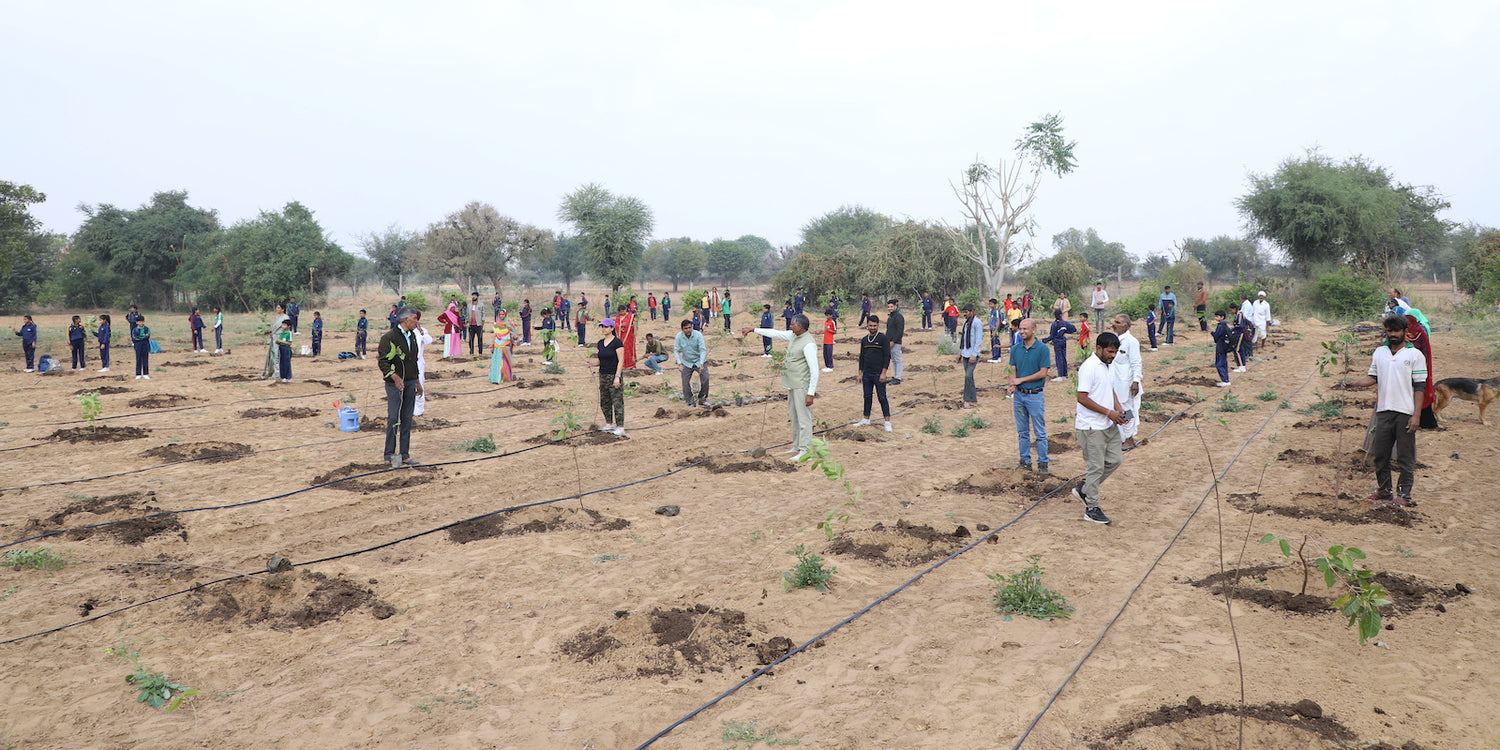Best Native Trees to grow near Kanpur: Cityscape Flourishment
Enriching Kanpur's urban landscape with native trees is not just about adding greenery; it's about fostering biodiversity, purifying the air, and crea Read more
Connect with us
-
👥 Corporates
If you are looking for:
- 🌲 Tree Plantation Events
- 📊 CSR Projects
📧 corporate@growbilliontrees.com
📞 +91 9699723523
💬 +91 9325931304 WhatsApp (Only)
🕒 Mon - Sat | 10am - 7pm IST
-
🧩 Tree Plantation NGOs
If you are looking for:
- 💰 Financial Assistance
- 🤝 Operational Support
📧 support@growbilliontrees.com
📞 +91 9699723523
💬 +91 9325931304 WhatsApp (Only)
🕒 Mon - Sat | 10am - 7pm IST
-
🌼 Individuals
If you are looking for:
- 👥 Group Tree Plantation Drive
- 🌳 Bulk Tree Plantation
📞 +91 9699723523
💬 +91 9325931304 WhatsApp (Only)
🕒 Mon - Sat | 10am - 7pm IST
Plantation Gallery
Trending
Trees for Corporates
Best Native Trees to grow near Kanpur: Cityscape Flourishment
Enriching Kanpur's urban landscape with native trees is not just about adding greenery; it's about fostering biodiversity, purifying the air, and creating vibrant, livable spaces. As Kanpur strides towards sustainability, nurturing indigenous trees becomes pivotal to its environmental stewardship. Here, we explore a diverse selection of native trees ideal for growing near Kanpur, each offering unique benefits to urban environments.
Banyan (Ficus benghalensis): With its sprawling canopy and aerial roots, the banyan tree stands as a majestic symbol of strength and resilience in Kanpur's parks and streets.
Neem (Azadirachta indica): Revered for its medicinal properties, the neem tree's leaves provide relief from the city's hustle and bustle, offering a serene retreat amidst urban chaos.
Peepal (Ficus religiosa): Symbolizing spiritual significance, the peepal tree's presence in Kanpur's landscapes connects residents to their cultural roots, fostering a sense of belonging.
Indian Rosewood (Dalbergia sissoo): Known for its sturdy wood, the Indian rosewood tree represents Kanpur's industrious spirit, anchoring the city's green spaces with its robust presence.
Indian Laburnum (Cassia fistula): Adorned with clusters of golden flowers, the Indian laburnum tree adds a touch of elegance and vibrancy to Kanpur's streetscapes, brightening up the urban environment.
Jamun (Syzygium cumini): Bearing succulent purple fruits, the jamun tree serves as a reminder of Kanpur's agricultural heritage, offering a taste of traditional flavors in the heart of the city.
Mango (Mangifera indica): Beyond its delicious fruit, the mango tree's shade provides a cool respite from Kanpur's sweltering summers, inviting residents to relax and unwind under its lush canopy.
Coconut (Cocos nucifera): With its versatile uses, the coconut palm embodies Kanpur's resourcefulness, offering nourishment, hydration, and even shelter to those in need.
Rain Tree (Samanea saman): With its wide canopy, the rain tree symbolizes Kanpur's commitment to sustainability, capturing rainwater and enriching the soil with its nitrogen-fixing roots.
Indian Almond (Terminalia catappa): With its glossy leaves, the Indian almond tree adds a touch of glamour to Kanpur's landscapes, reflecting the city's penchant for beauty and aesthetics.
Indian Cork Tree (Millingtonia hortensis): Fragrant and graceful, the Indian cork tree infuses Kanpur's air with its sweet aroma, creating an enchanting atmosphere in urban parks and gardens.
Flame-of-the-Forest (Butea monosperma): With its fiery orange blooms, the flame-of-the-forest tree ignites Kanpur's streetscapes with bursts of color, signaling the onset of spring.
Indian Coral Tree (Erythrina variegata): Adorned with crimson flowers, the Indian coral tree adds drama and allure to Kanpur's urban parks, captivating the hearts of passersby.
Indian Gooseberry (Phyllanthus emblica): With its tangy fruits, the Indian gooseberry tree tantalizes the taste buds of Kanpur's residents, offering a refreshing treat on hot summer days.
Indian Beech (Pongamia pinnata): With its oil-rich seeds, the Indian beech tree fuels Kanpur's sustainability efforts, providing a renewable source of energy for the city's future.
Indian Laurel (Terminalia elliptica): Resilient and adaptable, the Indian laurel tree mirrors Kanpur's ability to weather storms, standing tall amidst urban challenges.
Cluster Fig (Ficus racemosa): With its edible figs, the cluster fig tree nurtures Kanpur's wildlife, supporting a thriving ecosystem in the heart of the city.
Indian Mast Tree (Polyalthia longifolia): Tall and majestic, the Indian mast tree dominates Kanpur's skyline, offering a glimpse of nature's grandeur amid urban sprawl.
Indian Cork Fig (Ficus infectoria): With its fig-bearing branches, the Indian cork fig tree invites birds and bats to Kanpur's green spaces, enriching the city's biodiversity.
Mahua (Madhuca longifolia): Culturally significant, the mahua tree weaves stories of tradition and folklore into Kanpur's urban fabric, preserving the city's cultural heritage for generations to come.
Indian Sandalwood (Santalum album): prized for its fragrant wood, the Indian sandalwood tree adds an aura of mystique to Kanpur's landscapes, enchanting residents and visitors alike.
Cannonball Tree (Couroupita guianensis): Unique and exotic, the cannonball tree sparks curiosity in Kanpur's botanical gardens, inviting exploration and discovery.
Wild Almond (Sterculia foetida): With its large leaves and colorful fruits, the wild almond tree attracts birds and small mammals, adding vitality to Kanpur's urban ecosystem.
Wild Mango (Mangifera sylvatica): A wild counterpart to its cultivated cousin, the wild mango tree thrives in Kanpur's landscapes, symbolizing the untamed beauty of nature.
Indian Gooseberry (Emblica ribes): Similar to Phyllanthus emblica, Emblica ribes finds its home in Kanpur's green spaces, offering a haven for birds and insects amidst urban development.
Indian Beechwood (Pongamia glabra): Fast-growing and resilient, Pongamia glabra exemplifies Kanpur's spirit of progress, contributing to the city's reforestation efforts and urban greening initiatives.
Indian Coral Bean (Erythrina indica): Resilient and drought-tolerant, the Indian coral bean tree adds a splash of color to Kanpur's landscapes, thriving even in challenging environments.
Indian Fir (Abies spectabilis): Though native to the Himalayas, the Indian fir finds a second home in Kanpur's parks and gardens, offering a glimpse of mountainous beauty in the heart of the city.
Indian Cork Oak (Quercus serrata): Durable and steadfast, the Indian cork oak tree stands as a symbol of resilience in Kanpur's urban jungle, providing refuge for birds and wildlife.
Indian Laurel Fig (Ficus microcarpa): Versatile and adaptable, the Indian laurel fig tree adds charm and character to Kanpur's green spaces, inviting residents to connect with nature in their own backyard.
In the pursuit of greening Kanpur's urban landscape, initiatives like Growbilliontrees play a pivotal role. By collaborating with NGOs, corporates, and other stakeholders, Growbilliontrees provides the necessary technology, knowledge, and tools to optimize, organize, and monitor tree plantation activities. Through their concerted efforts, Kanpur can embark on a transformative journey towards a greener, healthier, and more sustainable future.
As Kanpur continues to evolve, let us not forget the importance of preserving and nurturing its native trees. By embracing these botanical treasures, we can ensure that Kanpur remains a vibrant, green city for generations to come.
Evergreen Trees
Evergreen trees are crucial for maintaining greenery in Kanpur year-round. Varieties like Neem and Indian Laurel provide consistent foliage, enhancing the city's visual appeal and contributing to its ecological balance.
Fast-Growing Trees
In Kanpur's rapidly developing urban landscape, fast-growing trees such as Rain Tree and Indian Cork Tree are indispensable. Their quick growth rate ensures swift establishment of green spaces, improving the city's overall livability and air quality.
Drought-Tolerant Trees
Given Kanpur's semi-arid climate, drought-tolerant trees like Pongamia and Peepal are essential for sustainable urban greening. These resilient species require minimal water, reducing irrigation needs and conserving precious resources while thriving in challenging environmental conditions.
Fruit-Bearing Trees
Incorporating fruit-bearing trees like Mango and Jamun into Kanpur's urban environment enhances its appeal and provides fresh produce for residents. These trees attract wildlife, promoting biodiversity and offering a tangible connection to nature within the city.
Native Flowering Trees
Native flowering trees such as Cassia and Tabebuia add vibrancy to Kanpur's streets and parks, attracting pollinators and delighting residents with their seasonal blooms. Their presence contributes to the city's visual charm and ecological balance.
Shade Trees
Shade trees are vital for providing relief from Kanpur's intense heat and creating comfortable outdoor spaces. Species like Gulmohar and Ashoka offer shade and respite, improving the quality of life for residents and visitors while also enhancing the urban environment.
You may like
Corporate Plantations
FAQ
What are the best native trees to grow near Kanpur for urban greenery?
Kanpur's urban landscape thrives with native trees like the Indian Neem (Azadirachta indica), Indian Rosewood (Dalbergia sissoo), Indian Coral Tree (Erythrina indica), and Indian Laburnum (Cassia fistula). These indigenous species are well-suited to Kanpur's climate and soil conditions, providing shade, biodiversity, and ecological resilience.
How can I ensure the successful growth of native trees in Kanpur's urban environment?
Successful tree growth in Kanpur relies on proper site selection, regular watering, appropriate fertilization, and protection from pests and diseases. Choosing native species suited to Kanpur's specific environmental conditions, such as hot and humid climate, is essential for their long-term health and vitality.
Are there any specific challenges in growing native trees in Kanpur's urban areas?
Kanpur's urban areas face challenges such as pollution, soil degradation, and limited green spaces. However, with proper care, community involvement, and sustainable urban planning, native trees can thrive in Kanpur, offering numerous environmental, social, and economic benefits.
What are the benefits of planting native trees near Kanpur?
Planting native trees near Kanpur offers various benefits, including improving air quality, reducing urban heat island effects, enhancing biodiversity, and providing habitat for native fauna. Additionally, native trees contribute to soil conservation, water recharge, and climate resilience, making them invaluable assets for sustainable urban development.
How can I get involved in native tree planting initiatives in Kanpur?
You can participate in native tree planting initiatives in Kanpur by volunteering for tree planting events, supporting local environmental organizations, or contributing to initiatives like ours at GrowBillionTrees.com through donations or sponsorship. Your involvement plays a crucial role in creating a greener and more livable Kanpur.
What is the impact of urban greenery on the quality of life in Kanpur?
Urban greenery in Kanpur positively impacts the quality of life by reducing air pollution, mitigating heat stress, enhancing aesthetics, and promoting physical and mental well-being. Additionally, urban green spaces provide opportunities for recreation, social interaction, and biodiversity conservation, enriching the city's cultural and ecological fabric.
Are there any government regulations or guidelines for planting native trees in Kanpur?
Yes, there are government regulations and guidelines for planting native trees in Kanpur, including species selection criteria, planting techniques, and maintenance standards. Compliance with these regulations ensures the successful establishment and management of native trees in the urban landscape.
How does GrowBillionTrees.com contribute to native tree planting efforts in Kanpur?
GrowBillionTrees.com actively contributes to native tree planting efforts in Kanpur by organizing tree planting campaigns, partnering with local stakeholders, and raising awareness about the importance of native trees for urban greening. Through our initiatives, we aim to create a more resilient, sustainable, and vibrant Kanpur for present and future generations.























